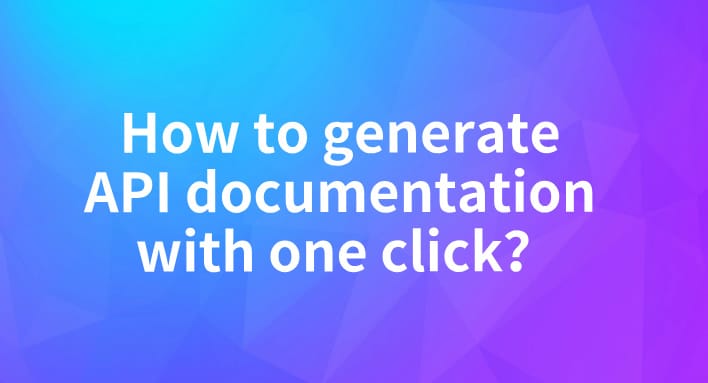How to generate API documentation with one click using EchoAPI?
EchoAPI is a rising star in the world of API documentation tools. I recently tried it out in a project, and it was a game-changer.
As a Java developer shaped by years of experience, I can't stress enough how crucial API documentation is. I've seen firsthand the chaos that arises from a lack of detailed API docs—it's a recipe for miscommunication, errors, and delays.
Why We Need API Documentation
Throwing back to one of my earlier projects, we had no proper API documentation. This led to endless back-and-forths between the frontend and backend teams, constant clarifications, and plenty of mistakes. The result? Our project timeline got stretched, bugs were rampant, and overall quality took a hit.
Lack of API documentation introduces several pain points:
- High Communication Costs: Without clear docs, team members have to repeatedly discuss API details, which is a massive time sink.
- Error Prone: Misunderstanding API usages is common, leading to frequent errors.
- Hard for Newbies: New team members struggle without systematic documentation, facing a steep learning curve that hampers productivity.
- Maintenance Nightmares: As APIs evolve, lack of clear documentation makes debugging and maintaining old code a daunting task.
In essence, API documentation isn't just a developer's reference; it's the backbone of seamless team collaboration.
Common API Documentation Tools

Postman
Postman is arguably one of the most well-known API testing tools out there. I've used it countless times to test and debug APIs. Plus, it can generate basic API docs.
Pros:
- User-Friendly: The interface is intuitive and easy to navigate.
- Feature-Rich: Beyond testing, it offers debugging, monitoring, and more.
Cons:
- Poor Integration: Integration with codebases is limited, making maintenance costly.
- Overkill: For just writing API docs, its extensive features can feel bloated.

Swagger (OpenAPI)
Swagger is another popular choice, especially for generating RESTful API docs. I've leveraged Swagger in multiple projects and appreciated its benefits.
Pros:
- Standardized: It follows the OpenAPI specification, producing widely accepted docs.
- Rich Ecosystem: Supports various languages and frameworks, with a wealth of plugins.
Cons:
- Steep Learning Curve: Mastering the OpenAPI spec can be time-consuming.
- Complex Configuration: Initial setup demands a thorough understanding of your project structure.
- Intrusive: Requires adding numerous annotations and decorators in your code, leading to clutter.

Enter EchoAPI: One-Click API Documentation Generation
EchoAPI is a rising star in the world of API documentation tools. I recently tried it out in a project, and it was a game-changer. It's designed to streamline the creation and maintenance of API docs.
Below is a sample API documentation that I generated with one click.

Advantages of EchoAPI
- Automated Generation: It parses code and auto-generates API docs, ensuring they stay in sync with your code.
- Highly Integrated: Seamlessly integrates with CI/CD tools, automating doc updates and reducing upkeep.
- Great UX: The interface is clean and user-friendly, allowing developers to quickly find what they need.
- Real-Time Previews: Supports live previews of docs, facilitating rapid iterations.
- Multi-Language Support: Not only does it support various programming languages, but it also offers document translation, enhancing global team collaboration.
Use Case
In a recent project, I used EchoAPI to generate our API docs. Here's how it went down:
- Define the API in the code.
- EchoAPI auto-parses these definitions to create initial docs.
- Use EchoAPI's interface to make necessary tweaks and additions.
- Once the docs are ready, they're automatically deployed via our CI/CD pipeline, ensuring alignment with the codebase.
A benefit for Java developers
If you are also a Java developer, you can use the EchoAPI IntelliJ IDEA plugin. This plugin can automatically identify APIs in your code and generate API documentation with one click. It also supports one-click debugging.

Conclusion
Effective, convenient API documentation is vital for modern software development teams. While Postman and Swagger are popular, they come with their own set of limitations. EchoAPI, with its automation, integration, and superior user experience, presents a compelling alternative.
Using the right tool to generate and maintain API docs can drastically boost team efficiency, minimize errors, and enhance overall project quality. I believe that as more developers discover EchoAPI, it will soon become a mainstream tool for API documentation.




 EchoAPI for VS Code
EchoAPI for VS Code

 EchoAPI for IntelliJ IDEA
EchoAPI for IntelliJ IDEA

 EchoAPl-Interceptor
EchoAPl-Interceptor

 EchoAPl CLI
EchoAPl CLI
 EchoAPI Client
EchoAPI Client API Design
API Design
 API Debug
API Debug
 API Documentation
API Documentation
 Mock Server
Mock Server








